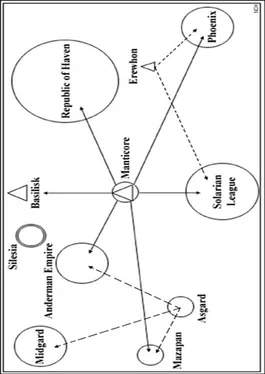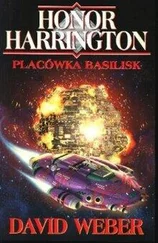David Weber - On Basilisk Station
Здесь есть возможность читать онлайн «David Weber - On Basilisk Station» весь текст электронной книги совершенно бесплатно (целиком полную версию без сокращений). В некоторых случаях можно слушать аудио, скачать через торрент в формате fb2 и присутствует краткое содержание. Жанр: romance_sf, на английском языке. Описание произведения, (предисловие) а так же отзывы посетителей доступны на портале библиотеки ЛибКат.
- Название:On Basilisk Station
- Автор:
- Жанр:
- Год:неизвестен
- ISBN:нет данных
- Рейтинг книги:5 / 5. Голосов: 1
-
Избранное:Добавить в избранное
- Отзывы:
-
Ваша оценка:
- 100
- 1
- 2
- 3
- 4
- 5
On Basilisk Station: краткое содержание, описание и аннотация
Предлагаем к чтению аннотацию, описание, краткое содержание или предисловие (зависит от того, что написал сам автор книги «On Basilisk Station»). Если вы не нашли необходимую информацию о книге — напишите в комментариях, мы постараемся отыскать её.
On Basilisk Station — читать онлайн бесплатно полную книгу (весь текст) целиком
Ниже представлен текст книги, разбитый по страницам. Система сохранения места последней прочитанной страницы, позволяет с удобством читать онлайн бесплатно книгу «On Basilisk Station», без необходимости каждый раз заново искать на чём Вы остановились. Поставьте закладку, и сможете в любой момент перейти на страницу, на которой закончили чтение.
Интервал:
Закладка:
Janacek wasn't the first, unfortunately, to denigrate Basilisk's importance, but his predecessors at least seemed to have based their feelings on something besides personal politics. The pre-Janacek theory, as far as Honor was able to determine, had been that since they were barred from putting in forces which might stand a chance of holding the system, there was no point making the effort. Thus, even many of those who supported the annexation saw the picket as little more than a trip-wire, advanced scouts whose destruction would be the signal for a response by the Home Fleet direct from Manticore. In short, some of them had argued, if any serious attack was ever mounted, there was no point sacrificing any more ships than necessary simply for the honor of the flag.
Janacek, of course, felt even more strongly than that. Since assuming control of the Admiralty, he had reduced the Basilisk picket below even the stipulated levels, for he saw it as a threat and a liability, not an asset. Left to his own devices, he would no doubt have simply ignored the system completely, and since he couldn't (quite) do that, he could at least see to it that he didn't waste any useful ships on it. And so Basilisk Station had become the punishment station of the Royal Manticoran Navy. Its dumping ground. The place it sent its worst incompetents and those who had incurred Their Lordships' displeasure.
People like Commander Honor Harrington and the crew of HMS Fearless .
CHAPTER FIVE
HMS FEARLESS decelerated smoothly towards a stop as she passed the inner perimeter of the Junction defenses. The Manticore System's G0 primary and its G2 companion were dim behind her, reduced to two more stars amid millions, for the Junction lay almost seven light-hours from them.
The duty watch manned their stations alertly, and a stranger on Fearless 's bridge might not have recognized the air of gloom which clung to them. But a stranger, Honor thought, reaching up to rub Nimitz's jaw absently, wouldn't have lived with these people for weeks now. A stranger wouldn't recognize their humiliation at being condemned to Basilisk Station, or the way they'd withdrawn ever deeper into their shells until the duties they performed were all they really had in common with their captain.
She leaned back, hiding her desire to sigh sadly behind a calm face, and watched the tactical display. Fearless 's projected vector stretched across it, terminating right on the half light-second outbound departure threshold of the Junction. The light cruiser's green bead tracked steadily down the thin line, threading its way through the mammoth defenses, and even in her own depression, Honor felt a familiar tingle at the firepower ringing the invisible doorway between the stars.
The smallest fortress out there massed close to sixteen million tons, twice as much as a superdreadnought, and its weapons-to-mass ratio was far higher. The forts weren't hyper-capable, for they used mass a warship might have devoted to its hyper generators and Warshawski sails to pack in still more firepower, but they were far more than immobile weapon platforms. They had to be.
Each of those forts maintained a stand-by battle watch and a 360° sidewall "bubble" at all times, but no one at this end of the Junction could know anyone was coming through it until they arrived, and no one could remain eternally vigilant. Thus a sneak attack—from, say, Trevor's Star—would always have the advantage of surprise; the attacker would arrive ready for battle, already seeking out targets for his weapons, while the defenders were still reacting to his arrival in their midst.
That was why no defensive planner placed his permanent defenses closer than a half million kilometers or so to a junction. If a hostile task force emerged within energy weapon range of the defenses, those defenses would be destroyed before they could reply, but ships transiting a wormhole junction arrived with a normal-space velocity of barely a few dozen kilometers per second, far too little for a high-speed attack run. With the closest forts so far from him and too little speed for a quick run-in to energy weapon range, any attacker must rely on missiles, and even impeller-drive missiles would require almost thirty-five seconds to reach them. Thus the forts' duty watches—in theory, at least—had time to reach full readiness while the weapons accelerated towards them. In practice, Honor suspected, most of them would still be coming on-line when the missiles arrived, which was why their point defense (unlike their offensive weaponry) was designed for emergency computer override even in peacetime.
In time of war, the forts would be augmented by thickly seeded remote laser platforms—old-fashioned, bomb-pumped laser satellites—much closer in and programmed to automatically engage anything not positively identified as friendly, but such measures were never used in peacetime. Accidents could always happen, and the accidental destruction of a passenger liner whose IFF wasn't recognized could be embarrassing, to say the very least. An attacker would still have sufficient surprise advantage for his energy batteries to kill a lot of satellites before they could respond, but enough of them would survive to handle him very roughly indeed.
Nonetheless, heavy losses could be anticipated in the inner fortress ring under the best possible circumstances, so the "forts" in the outer rings had to be able to move to fill in the gaps and mass upon an attacker. Their maximum acceleration rates were low, well under a hundred gravities, but their initial positions had been very carefully planned. Their acceleration would be enough to intercept attacking forces headed in-system, and their engines were sufficiently powerful to generate impeller wedges and sidewalls to protect them.
Yet for all their numbers, firepower, and mobility, the fortresses were too weak to stop a worst-case, multiple-transit attack by an opponent as powerful as the Havenite Navy. And that, she told herself moodily as Fearless killed the last of her speed and slid to a halt, was the real reason Manticore had annexed Basilisk in the first place.
The central nexus was the key to any wormhole junction. Ships could transit from the central nexus to any secondary terminus and from any secondary terminus to the central nexus, but they could not transit directly from one secondary terminus to another. Economically, that gave Manticore a tremendous advantage, even against someone who might control two or more of the Manticore Junction's termini; militarily, the reverse was true.
There was an inviolable ceiling, varying somewhat from junction to junction, on the maximum tonnage which could transit a wormhole junction terminus simultaneously. In Manticore's case, it lay in the region of two hundred million tons, which set the upper limit on any assault wave the RMN could dispatch to any single Junction terminus. Yet each use of a given terminus-to-terminus route created a "transit window"—a temporary destabilization of that route for a period proportionate to the square of the mass making transit. A single four-million-ton freighter's transit window was a bare twenty-five seconds, but a two-hundred-million-ton assault wave would shut down its route for over seventeen hours , during which it could neither receive reinforcements nor retreat whence it had come. Which meant, of course, that if an attacker chose to use a large assault wave, he'd better be absolutely certain that wave was nasty enough to win.
But if the attacker controlled more than a single secondary terminus, he could send the same tonnage to the central nexus through each of them without worrying about transit windows, since none would use exactly the same route. Choreographing such an assault would require meticulous planning and synchronization—not an easy matter for fleets hundreds of light-years apart, however good the staff work—yet if it could be pulled off, it would allow an attack in such strength that no conceivable fortifications could stop it.
Читать дальшеИнтервал:
Закладка:
Похожие книги на «On Basilisk Station»
Представляем Вашему вниманию похожие книги на «On Basilisk Station» списком для выбора. Мы отобрали схожую по названию и смыслу литературу в надежде предоставить читателям больше вариантов отыскать новые, интересные, ещё непрочитанные произведения.
Обсуждение, отзывы о книге «On Basilisk Station» и просто собственные мнения читателей. Оставьте ваши комментарии, напишите, что Вы думаете о произведении, его смысле или главных героях. Укажите что конкретно понравилось, а что нет, и почему Вы так считаете.












